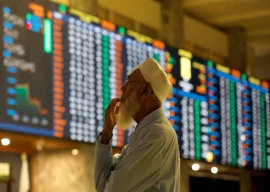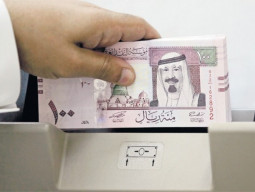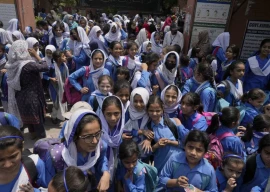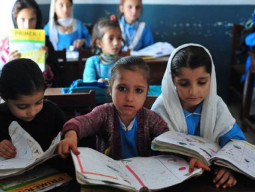The International Monetary Fund (IMF) has cleared the air saying that any new short-term loan programme should not be signed with Pakistan, as reforms envisaged in the last previous programme could not be implemented.
The IMF expressed these views in the post-evaluation draft report of the $11.3 billion bailout programme that culminated prematurely after Pakistan failed to implement the much-needed reforms, said officials who have read the document.
Pakistani authorities were expected to head to the IMF in case of a looming default, says a source.
The draft report is currently lying on the desk of the finance minister and awaiting his review. Due to Islamabad’s inability to honour its commitments, the Washington-based lending agency withheld the last two tranches amounting to $3.4 billion. Signed in October 2008 for a period of 25 months, Pakistan received its last tranche under the stand-by programme in May 2010. A-nine month extension in the programme also could not convince Pakistan to implement the crucial reforms.
The IMF’s comments came at a time when Pakistan’s economy is weakening and the country’s foreign currency reserves have come under extreme pressure due to much higher than the anticipated trade deficit, a measure of how much imports exceed exports.
With doors closing on a short-term programme, in case of a default on international payments, the IMF would stress on signing a long duration programme.
The last programme was seen as an easy access to money where the lending institution gave $3.1 billion upfront, said Meekal Ahmad, a former IMF official, while giving a lecture on Pak-IMF relations last month. He had said then that in future the IMF would not give funds upfront and would rather ask Islamabad to take prior actions for qualifying for a new programme.
When contacted finance ministry officials refused to comment on the report arguing that the ministry has not yet compiled its observations and are waiting for the Finance Minister Abdul Hafeez Shaikh to return from holidays.
Sources said the IMF has outlined three main reasons for failure of the last programme. It has said that Pakistan could not honour its commitments due to lack of political support and deterioration in the security situation that put extra burden on finances. It further said the global economic crisis also adversely affected the programme.
The biggest failure of the programme was the non-implementation of the reformed General Sales Tax as the government could not convince the Parliament to approve the RGST Bill.
While acknowledging success in the first-year of implementation, the IMF also termed the reforms agenda “ambitious”, said the source. However, the Fund has not shared any responsibility for premature culmination of the programme. It argued in the report that the programme was designed by the Pakistani government and the IMF only supported the agenda of what is dubbed as home-grown reforms agenda by former Finance Minister Shaukat Tarin.
The sources said that IMF further stated that at the time of signing the bailout programme, Pakistan had debt sustainability problems. Even then the IMF gave loans in the hope that the Pakistan authorities will increase tax-to-GDP ratio, the sources added while quoting the draft report.
Ironically, instead of any increase, the country’s tax-to-GDP ratio has further deteriorated.
While defending its decision to give budgetary support to Pakistan, the IMF said other world donors got complacent, which adversely affected foreign inflows.
After 2010’s floods, the IMF had given $450 million in budgetary support as an exception. The Fund primarily lends for strengthening balance of payment position.
Published in The Express Tribune, July 14th, 2012.
COMMENTS (9)
Comments are moderated and generally will be posted if they are on-topic and not abusive.
For more information, please see our Comments FAQ











1734511806-0/Untitled-design-(5)1734511806-0-270x192.webp)
1734468458-0/Copy-of-Untitled-(50)1734468458-0-270x192.webp)










@Was A Pakistani: I don't know what are talking about that the people should realize, it is not the common people who should tighten the belts but the elite class of Pakistan, they are the ones who see no tomorrow, and let us not forget the corrupt at the helm of the Pakistani affairs , they don't pay their fair share of taxes and siphon off the loans when ever they are sanctioned by foreign entities, in the end it is the common people who are paying through their noses. When you visit next time, then look around you, how and what they are doing to the country's financial health. Pakistan could stand on it's own with out these bail outs if the fair share of taxes are collected from all sectors including agriculture and curtail this addiction to corruption in every segment of life in Pakistan. Who could do it , beats me, is there any honest person left in the country who is not tainted and could clean up this mess,
It was expected ...Corruption at it's peak how come country revive
It's a pretty weird situation going on in Pakistan. We can't increase the policy any further to keep the business men happy and we can't put taxes on agriculture because our government is based on individuals from that particular background.
We just keep getting saved by the heavy remittances and by playing the NATO supply card. The remittances this year surpassed the 13 billion mark and since the NATO supply is ON! There will be a few dollars coming in from that. USAID is also back on! so another good thing for the economy. The decreasing international oil prices have also been helpful in sustaining the situation. I can never say that its under control but thats how its always been here in Pakistan! We never really had heaps of reserves because we never really bothered to increase our exports (Goods or Services ),
Its simple commomsense ! How can you help this Nation, when it refuses to implement the basic Taxes ?? Rest assure there will be no easy money in future too, from any Institutions !
One may be able to postpone the inevitable for a short while and if action is not taken the enviable will happen.
Why our rulers are not willing to undertake reforms in the trade and monetary regimes. They don't understand or they don't care ?
That's polite language for saying you lied in order to get the last loan -- something that would land an individual in jail in some countries.
I hope Pakistan defaults.... this is the only way to see some improvement and realization amongst common people that we cant exist in isolation and need the world which we are fast shunning out. IMF also knows we will lie and fudge figures to get money but will never honour our committment,
Unless Pakistan gets serious about improving and correcting the fundamentals of macro economy, IMF and others should not advance loans and bail out Pakistan. There should be clear pre-actions that Pakistan should take before it gets new loans. Tax to GDP ratio should be increased by increasing "direct taxes" and bringing agriculture into tax net